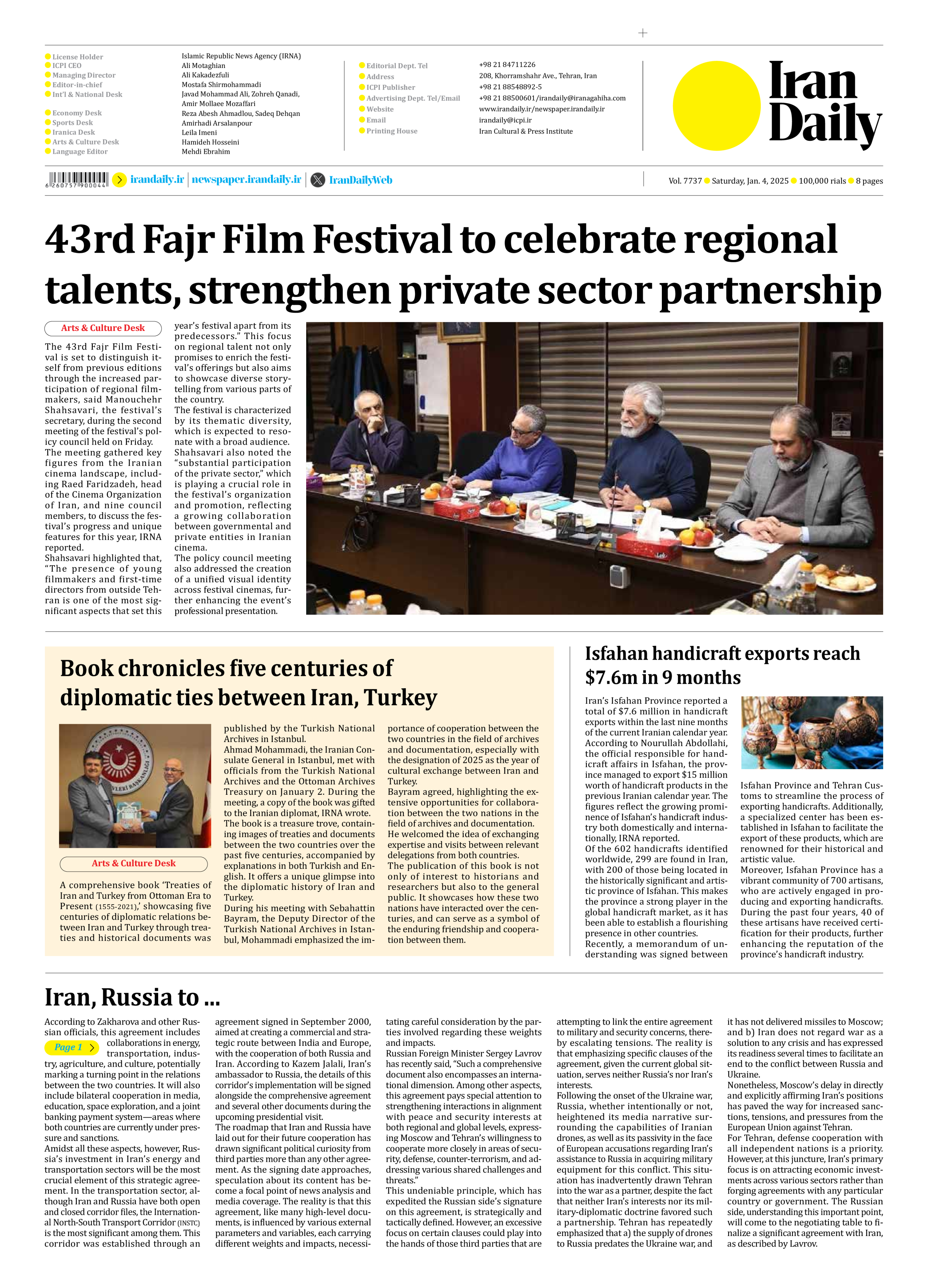
Iran, Russia to ...
Page 1
According to Zakharova and other Russian officials, this agreement includes collaborations in energy, transportation, industry, agriculture, and culture, potentially marking a turning point in the relations between the two countries. It will also include bilateral cooperation in media, education, space exploration, and a joint banking payment system—areas where both countries are currently under pressure and sanctions.
Amidst all these aspects, however, Russia’s investment in Iran’s energy and transportation sectors will be the most crucial element of this strategic agreement. In the transportation sector, although Iran and Russia have both open and closed corridor files, the International North-South Transport Corridor (INSTC) is the most significant among them. This corridor was established through an agreement signed in September 2000, aimed at creating a commercial and strategic route between India and Europe, with the cooperation of both Russia and Iran. According to Kazem Jalali, Iran’s ambassador to Russia, the details of this corridor’s implementation will be signed alongside the comprehensive agreement and several other documents during the upcoming presidential visit.
The roadmap that Iran and Russia have laid out for their future cooperation has drawn significant political curiosity from third parties more than any other agreement. As the signing date approaches, speculation about its content has become a focal point of news analysis and media coverage. The reality is that this agreement, like many high-level documents, is influenced by various external parameters and variables, each carrying different weights and impacts, necessitating careful consideration by the parties involved regarding these weights and impacts.
Russian Foreign Minister Sergey Lavrov has recently said, “Such a comprehensive document also encompasses an international dimension. Among other aspects, this agreement pays special attention to strengthening interactions in alignment with peace and security interests at both regional and global levels, expressing Moscow and Tehran’s willingness to cooperate more closely in areas of security, defense, counter-terrorism, and addressing various shared challenges and threats.”
This undeniable principle, which has expedited the Russian side’s signature on this agreement, is strategically and tactically defined. However, an excessive focus on certain clauses could play into the hands of those third parties that are attempting to link the entire agreement to military and security concerns, thereby escalating tensions. The reality is that emphasizing specific clauses of the agreement, given the current global situation, serves neither Russia’s nor Iran’s interests.
Following the onset of the Ukraine war, Russia, whether intentionally or not, heightened its media narrative surrounding the capabilities of Iranian drones, as well as its passivity in the face of European accusations regarding Iran’s assistance to Russia in acquiring military equipment for this conflict. This situation has inadvertently drawn Tehran into the war as a partner, despite the fact that neither Iran’s interests nor its military-diplomatic doctrine favored such a partnership. Tehran has repeatedly emphasized that a) the supply of drones to Russia predates the Ukraine war, and it has not delivered missiles to Moscow; and b) Iran does not regard war as a solution to any crisis and has expressed its readiness several times to facilitate an end to the conflict between Russia and Ukraine.
Nonetheless, Moscow’s delay in directly and explicitly affirming Iran’s positions has paved the way for increased sanctions, tensions, and pressures from the European Union against Tehran.
For Tehran, defense cooperation with all independent nations is a priority. However, at this juncture, Iran’s primary focus is on attracting economic investments across various sectors rather than forging agreements with any particular country or government. The Russian side, understanding this important point, will come to the negotiating table to finalize a significant agreement with Iran, as described by Lavrov.







